
[Panel from "Pasha Noise" by Brian Kim Stefans and Gary Sullivan.]
Exaggeration defines Otherness even as it insults it. It is often a key element of racist portrayals & jokes, but it can also be important for language acquisition, in particular pronunciation, which requires a similar kind of—in this case, necessarily—ignorant mimicry.
One way to learn how to pronounce the distinctly American schwa or “R” sound might be to imitate a cowboy. The subtleties of Hindi’s non-aspirated retroflex consonants

can most easily be approximated by conjuring up an “Indian” voice in one’s head, and parodying it, exaggerating what is going on in your mouth. You have to exaggerate or you simply won’t get it. Because your mouth hasn’t done that before. That may in fact be why it feels like an exaggeration.
Exaggeration can also be used to define oneself, especially as “other”—if one understands the word “define” to mean something like “make stand out against.”
Among American pop musicians of the mid-20th century, few stood out as much as Jalacy J. Hawkins, aka Screamin Jay Hawkins.

Screamin Jay: “I did 'Don’t Knock the Rock,' but they cut it out—they even paid me for it, but they cut it out because I walked on naked with a loin cloth across here, white shoe polish marks on my face, my hair combed straight up, a spear in one hand and a shield in the other, like one of those wild Mau Maus and I was singing a song called ‘Frenzy.’ The movie people claimed it would be an insult to black people of the United States. I bet it would go over today. Again, I was trying to explain to them that I was different, I do everything different. Do you realize they banned ‘I Put a Spell on You’ because it had cannibalistic sounds? When they banned it, it had already sold a million. When they banned it, it sold another quarter of a million. I wish they’d ban every record I made.”
There were two versions of Hawkins’ song, one specially made for conservative radio, sans “cannibalism,” although it is unclear whether it was really “cannibalism” and the resulting fear of insulting African-Americans that kept the other version off the air. Another possibility is that some conservative white station managers and DJs may have simply found it a bit too “black”—Hawkins’ theatrical, liquor-inspired wildness perhaps playing into their “understanding” of what African-Americans “were.”
It is a decidedly popular song, especially around Halloween. “I Put a Spell on You,” has been recorded by numerous artists over the years, including Creedence Clearwater Revival, Nina Simone, The Animals, Bryan Ferry, Joe Cocker, Marilyn Manson, and Notorious B.I.G., who sampled the bass line and sped it up for “Kick in the Door.” But one of the most interesting uses of this already exaggerated admission of voodoo and obsession—one might go so far as to call it stalking—is a club-friendly version by the Belgian-born, half-English, half-Arabic Natacha Atlas, who re-imagines Hawkins’ “cannibalism” in beladi rhythm and “oriental” strings.
The question arises: what is the “spell” and who’s under it? Atlas has far more of a European and American audience than an Arabic one, something few other Arabic artists can—or may want to—claim. One reason is simple: She is not a product of Egypt, or Lebanon, or Algeria, or Palestine, or Iraq. She once termed her music "cha'abi moderne,” a reference to Egyptian pop, but it’s really World Music, with a capital W—Arabic music whitewashed of some of the melodrama, the looseness of orchestra, and giddy “overuse” of synthesizers and other keyboards that makes a sizable chunk of contemporary Arabic pop unlistenable to many Westerners. (As a poetry critic we know once said of the great Oum Kalsoum: “To me it just sounds … amateurish.”)
Exaggeration is the defining characteristic of Otherness for many. Mambo for Norte Americanos was not Tito Rodriguez’s sublime “Mambo Mona (Mama Guela),” but Perez Prado’s exaggerated “Mambo 5.”

"I am a collector of cries and noises," Prado once told an interviewer, "elemental ones like sea gulls on the shore, winds through the trees, men at work in a foundry. Mambo is a movement back to nature, by means of rhythms based on such cries and noises, and on simple joys."
Born in Cuba in 1916, Perez composed for a number of Cuban bands in the 40s before reportedly being blacklisted for incorporating too much northern Jazz into his compositions. He ultimately made his way to Mexico City, where he recorded the work that would make him an international sensation.
Above is a live recording of his “Broadway Mambo,” ca. 1955.

Without the Silk Road, there would be no dandies, for there would have been no dye vivid enough, no fabric luxurious enough, to have created them. Beau Brummel, the original dandy whose name has come to be synonymous with dandyism, is of the most exaggerated examples of post-renaissance male stylishness. He once made the king cry by criticizing his outfit. Brummel was an obsessive-compulsive aesthete who would immediately discard an imperfectly tied cravat, leaving a heap of cravats to be tended to by the help, and he was said to have drunk champagne out of his boot. Brummel paved the way for the dashing figure Theophile Gautier, author of Comedy of Death, who was known not only for his extensive travels to exotic lands but also his flaming scarlet waistcoat, and whose dear friend, poet Gerard de Nerval, was known for walking his pet lobster about on a leash (if you believe Gautier’s stories) in the Jardin de Luxembourg.
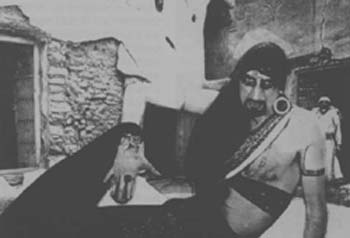
The lobster was no doubt an influence on Jack Smith, who later chose to walk a (fake) penguin around as a kind of mascot.

In Rodney Koeneke’s Rouge State, you can hear the echoes of the footsteps of the ghost of Theophile Gautier walking a lobster through the grand opera of the poems. They are deeply dandified "hostile melodic situations", as "brazen as mariachis" and "fecunder than succotash." They are "delicate lorgnettes" that can see all of history happening at once, and "mentholated curlicues" full of "pterodactyl dactyls" and "hot pink verbs." The figure of the dandy, of course, most lately born into the media as the overcommodified metrosexual, represents the perfect union of the masculine and feminine principles, and is unimaginable without fine fabrics of oriental origin. Indeed, the attars of the mysterious "east" soak into every crevice of Rodney's poetry but laced with pungent irony and historical awareness, so that the story of an odalisque is also the story of how our own tabula rasa get written all over with learned desires:
We spill in the world into genders,
fall out like dirty turpentine
from an upset coffee cup --
at first abductees of the harem
refusing silk pillows and gold-tipped cigarettes
then gradually learning to simper and sprawl ...

In “The Story of Chinita Juanita Banana,” Sakura Maku exaggerates the typical immigrant narrative to stereotypes and cultural markers “appropriate” for people of Japanese/Indonesian decent—bombs named “fat boy,” “skinny boy,” and “normal one,” float over Japan along with a dozen bananas and Sakura’s grandparents. The family grows and eventually moves: “America: We arrived on a big banana. And glory sucked us in.”

"Home on the Range" gets nearly a full page.

Once the narrative shifts to New York, Sakura underscores her “alien” status with images of outer-space aliens.

She’s not the first to do this in comics.
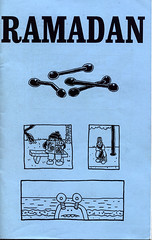
Tom Hart’s Ramadan, self-published in 1997, emphasizes the “alienation” one feels in another culture by having an alien parallel the protagonist's experience.
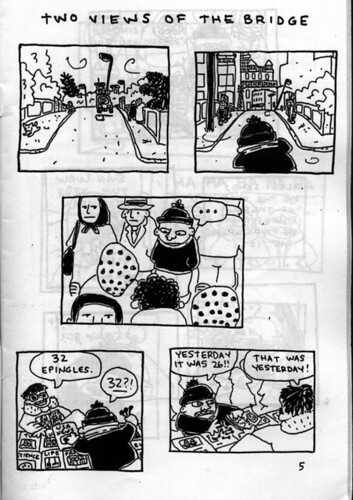
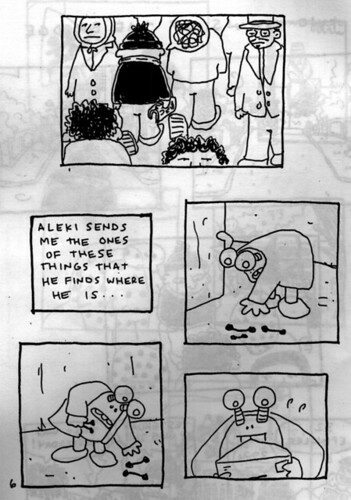
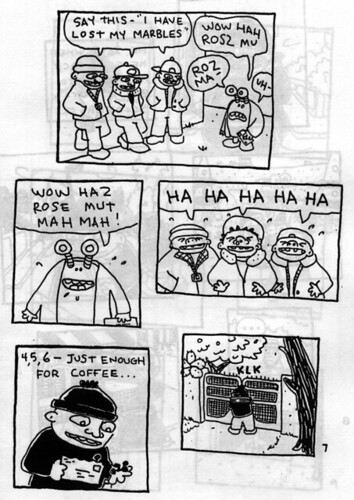
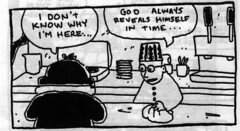
In an e-mail to us last week, Tom described the circumstances that went into the creation of this comic. "The whole thing was written and drawn in Morocco, where I spent 5 winter months with a girlfriend. We basically spent it breaking up, I spent it going broke and trying to learn a little Moroccan Arabic and a little French. I tried to capture the emotional landscape best I could. So: two aliens, one worse off than the other, trying to navigate a world whose indifference was not aggressive, but was sharp enough to leave marks."

It almost goes without saying that Kathy Acker's work, especially mid-period books like Great Expectations, are exaggerated in their hyperviolent enactments of S&M.
To enact S&M is to play out the idea of "otherness" exaggerated to polarized opposites. As she writes in Great Expectations, "I made a list of human characteristics: every time I had one characteristic I had its opposite." This is not an expression of complexity, but of simplicity: the world reduced to polarized opposites: Everything and everyone become something or someone else's "other."
One of many memorable lines from the book: "She should put lots of porn in this book cunts dripping big as Empire State Buildings in front of your nose and then cowboy violence: nothing makes any sense anyway."
Acker delivers this over-the-top porn and violence in fits in starts.
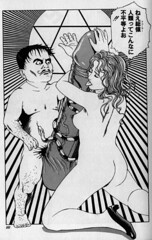
We find a much more sustained version in the work of Japanese underground comics artist Suehiro Maruo. For reasons we've never been able to figure out, Maruo--who is not Jewish--takes the Star of David as his personal symbol: you often see it on the overleaf of the covers of his books, or directly under his name on the title or copyright pages. In his one interview in English--coincidentally in the Israeli comics anthology, DEAD HERRING, Maruo doesn't mention the Star of David, nor does his interviewer, Israeli comics artist Yirmi Pinkus, ask.
Very little of his work has been translated into English, but we picked up a dozen of his books while in Tokyo last year. They're filled with extremes of violence and sexuality, ranging from cannibalism, copraphilia, ritual sexualized mutilation. His fans are typically kids in their 20s, some of whom dress up as his characters, and send him photographs ... to which he reportedly does not respond.
This is from a short comic, "Planet of the Jap."

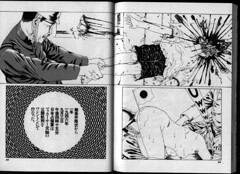

The hypersexual, hyperviolent, hyperweird imagery of Suehiro Maruo evokes other post-Hiroshima Japanese cultural phenomena as well – such as the plays and poetry of Terayama Shuji, one of whose tanka we'll quote here:
A fetus
preserved in alcohol
growing cloudy…
in my head
hydrangea blossoms
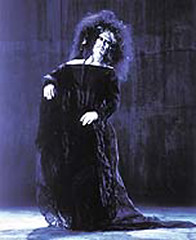
But more than anything, post atomic Japan evokes the moody strain of Butoh that emerged from the great Hijikata Tatsumi – the dark side of the twin founders of Butoh (Ono Kazuo represented the lighter, sweeter side). Hijikata spoke and wrote in extreme poetry, insisting that he could only address Butoh on its own terms and not from a critical discourse outside of it. Here’s a sample of his hyperdramatic rhetoric from 1961:
Sending hysterical works to the theatre has great significance these days. We have the right to ask for a guarantee of actuality among the random noise and bad taste that are the equivalent of almost raw materials. The sublime asceticism of crime. A totally empty face which endures torture. Young people who have cleverly acquired a nonsensical vitality. The pure despair that emerges before hope is crushed. My task is to organize these into a dance group and to make them into naked soldiers.
His most prominent protégé, Akaji Maro, has carried on Hijikata’s tradition by organizing the dance group Dai Rakuda Kan (which translates as, appropriately enough to the subject of this talk, big camel tent).
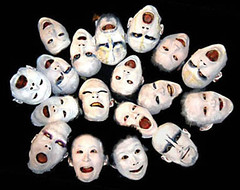
Maro, although slight of build, is one of the hugest stage presences I have ever seen. In one performance I [Nada] saw many years ago in Tokyo, he rode onto the stage on a giant Harley-Davidson (a real one – I recall the smell of the exhaust fumes) dressed as General Douglas MacArthur, but with Maro’s characteristically menacing kabuki-esque face makeup. As do many male butoh dancers, notably Ono Kazuo and Kasai Akira, he often appears in women’s clothing, and like his teacher Hijikata, Maro speaks in and choreographs with poetic language. Asked by an interviewer about the extraordinary verbal creativity of all of the butoh masters, Maro replied,
The body drinks in the words and they completely dissolve there, leaving only the state of the body, with its movements, and that state, or whatever you wish to call it, is all that exists. Even if you are just standing empty-minded, that is enough.
dig this high replica bags Read Full Report replica ysl handbags go now Ysl replica handbags
ReplyDeletew4r96g6i91 u0x57s8u64 j3y23b1m47 q8b56j1b02 i7c47s6h50 z3i09t5f78
ReplyDelete